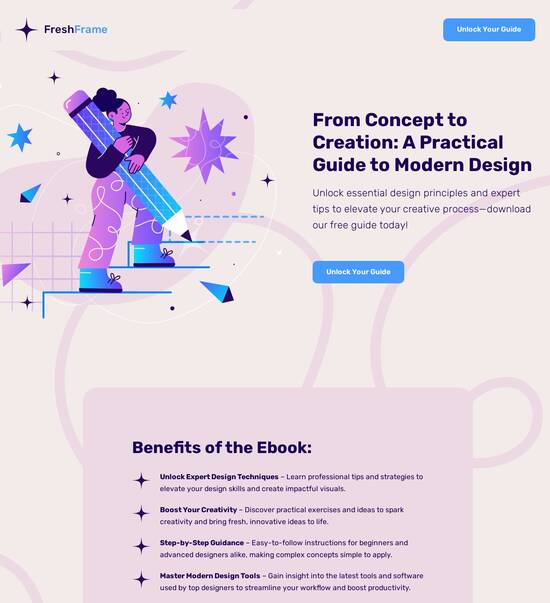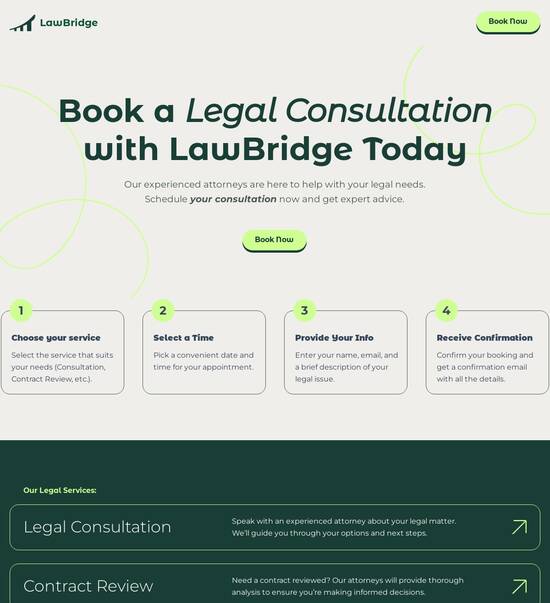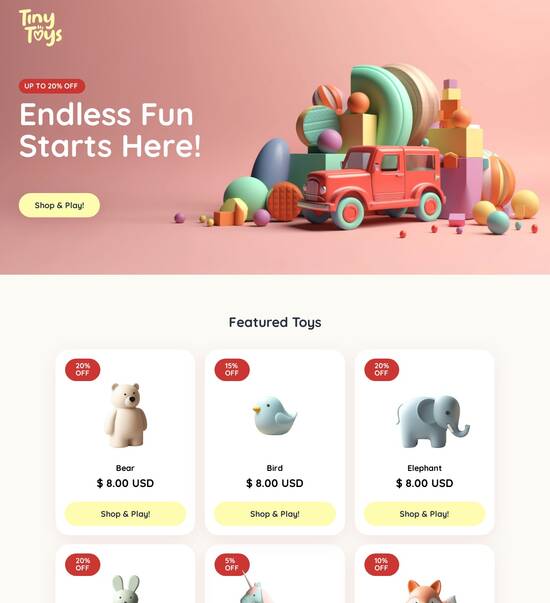
Website Template for Tool and Die Makers
Explore Similar TemplatesAbout template
Create custom landing pages efficiently with 500+ conversion-focused layouts, experimentation features, personalized content, and collaboration tools for marketers in Business Services, Tech/SaaS, and more.
Recommended templates

Easy to build without coding
With the intuitive drag-and-drop builder, anyone on your team can create high-converting pages without any knowledge of code or design. Make enhancements to your landing page with custom widgets using Javascript, HTML/CSS, or third-party scripts.

Multiple layouts for any industry and goal
Select from 500+ landing page layouts built to boost conversions across industry-specific scenarios. Customize them by adjusting fonts, adding images, and generating on-brand content with the AI assistant. Quickly scale with Instablocks® and Global Blocks that you can save, reuse, and update globally.

Loads fast and looks polished on any device
Every template is responsive, which means they present professionally on any device and load blazingly fast with our Thor Render Engine. You can also power them up with Google AMP technology to deliver an unparalleled mobile experience and drive higher conversions.

Robust analytics & experimentation
Get real-time updates and reporting across all your devices, showing the number of visitors, conversions, cost-per-visitor, and cost-per-lead. Launch AI-powered experiments, run A/B tests, and use heatmaps to analyze user behavior, then optimize your landing page to maximize conversions.







Easy to build without coding
With the intuitive drag-and-drop builder, anyone on your team can create high-converting pages without any knowledge of code or design. Make enhancements to your landing page with custom widgets using Javascript, HTML/CSS, or third-party scripts.
Multiple layouts for any industry and goal
Select from 500+ landing page layouts built to boost conversions across industry-specific scenarios. Customize them by adjusting fonts, adding images, and generating on-brand content with the AI assistant. Quickly scale with Instablocks® and Global Blocks that you can save, reuse, and update globally.
Loads fast and looks polished on any device
Every template is responsive, which means they present professionally on any device and load blazingly fast with our Thor Render Engine.
Robust analytics & experimentation
Get real-time updates and reporting across all your devices, showing the number of visitors, conversions, cost-per-visitor, and cost-per-lead. Launch AI-powered experiments, run A/B tests, and use heatmaps to analyze user behavior, then optimize your landing page to maximize conversions.
All the features you need to build lead-generating landing pages
Explore more featuresLearn how to build top-performing landing pages for any goal
FAQs
Leading the way in building high-performing landing pages





A guide on creating effective landing pages with Instapage
In today's competitive digital landscape, marketers need powerful tools that enhance their marketing campaigns and optimize conversions. Instapage stands out as the most powerful landing page and conversion rate optimization (CRO) platform, offering a comprehensive solution tailored for marketing teams across various sectors including business services and tech companies in the USA. This guide provides a step-by-step approach to leveraging Instapage for optimizing your campaigns effectively.
Understanding the importance of landing pages
Landing pages play a crucial role in digital marketing as they serve as dedicated web pages focused on a specific purpose - usually to convert visitors into leads or customers. The high-converting templates provided by Instapage help marketers to design targeted pages that resonate with their audience and drive measurable results. Effective landing pages can significantly impact customer engagement and increase ROI.
- Audience targeting: Tailor your landing pages to meet the specific needs of your target demographics.
- High-converting elements: Use compelling visuals and clear calls-to-action (CTAs) to encourage user interaction.
- Data-driven insights: Leverage analytics to refine and optimize landing page performance.
Step 1: Selecting the right template
The first step in building a successful landing page is choosing the right template that aligns with your marketing goals. Instapage offers 100+ ready-to-use, conversion-focused templates that can be customized to reflect your brand. When selecting templates, consider factors like layout, color scheme, and overall design that are most appealing to your audience.
Step 2: Customizing your landing page
Once you've chosen a template, the next step is customization. Utilize the drag-and-drop builder to add your branding and content seamlessly.
- Dynamic text replacement: Automatically match your ads to landing pages for higher relevance.
- AdMaps: Align specific ads to the corresponding landing pages for a streamlined experience.
- Visual assets: Upload your images and videos to create an engaging narrative on your landing pages.
Step 3: Optimizing for conversions
With your landing page in place, it's essential to optimize it for maximizing conversions. This includes employing A/B testing to evaluate different versions of your page, utilizing heatmaps to analyze user behavior, and leveraging performance metrics available in the analytics dashboard.
- A/B testing: Test different headlines, images, and CTAs to find the most effective combinations.
- Real-time feedback: Use collaboration features to gather insights from team members or stakeholders for continuous improvement.
- Analytics: Regularly monitor page performance metrics to adjust strategies accordingly.
By following these steps, marketers can create landing pages that not only attract traffic but also drive meaningful conversions.
Ready to transform your digital marketing campaigns with Instapage? Start your journey today and experience the difference effective landing pages can make.
People also ask about Website template for Tool and die makers
Website template for tool and die makers
Understanding the unique landscape of tool and die makers
The tool and die industry holds a critical role within the broader manufacturing sector. This industry provides the necessary tools and dies to create products across various fields, significantly influencing the quality and efficiency of production processes. The historical importance of tool and die makers dates back to the Industrial Revolution, where precision manufacturing began to emerge as a key driver of economic growth and industrial capability. Over the decades, this industry has continued to evolve, adapting to new technologies and market demands while remaining integral to manufacturing.
Despite its significance, the tool and die industry faces numerous challenges. Intense competition, fluctuating material costs, and the need for increasingly stringent quality standards are just a few hurdles that tool and die makers encounter. Furthermore, a skilled labor shortage and the necessity to remain updated on technological advancements require significant investments in employee training and development. In such an environment, having a robust digital presence is crucial. A website acts as a marketing tool and serves as a platform for client relations, providing valuable information and showcasing a company’s capabilities.
Understanding industry challenges can help tailor marketing strategies.
A strong digital presence increases brand visibility and credibility.
Websites provide essential information and facilitate client engagement.
Defining the target audience
Identifying the audience is foundational for tool and die makers when crafting a website. Tool and die makers are specialists who design and manufacture the tools necessary to shape and assemble products. Their clients vary from automotive manufacturers and aerospace companies to consumer goods producers. Understanding these diverse client needs is paramount for creating relevant content and functionalities on the website. A firm grasp of the market landscape enables companies to craft targeted narratives that speak directly to potential clients.
Equally important is recognizing the internal stakeholders involved in the tool and die production process. This includes engineers, production managers, and operators who rely on the tools and dies for their daily operations. Tailoring content that resonates with employees is vital for fostering a collaborative culture and ensuring everyone is aligned with the company’s objectives. Engaging content can facilitate improved employee morale and performance, allowing better alignment between organizational goals and individual contributions.
Architecture of an effective website template
The design architecture of a website template for tool and die makers should be both appealing and functional. Customizable design elements are crucial to reflect a company's unique visual identity. This includes color schemes, typography, and images that align with the brand’s core values. By integrating company branding effectively, businesses can enhance their recognition and credibility in a crowded market. Different layout options, such as grid or list views, can be utilized to showcase products and services based on the preferences of target customers.
User-friendly navigation is another critical aspect of a well-structured website. Given the diversity of users, menu structures should clearly highlight services and areas of expertise. An intuitive navigation system enables visitors to find information quickly, which is advantageous for busy professionals in the industry. Additionally, accessibility considerations must be incorporated into the design to ensure that it meets the needs of all users, including those with disabilities. This thoughtful approach contributes to a positive browsing experience and encourages visitors to engage more deeply with the content.
Customizable design establishes brand identity.
User-friendly navigation simplifies the visitor experience.
Accessibility ensures inclusivity for all potential clients.
Key features that elevate user engagement
A website template for tool and die makers should include several key features to enhance user engagement. One innovative feature is a skills matrix template, allowing companies to showcase the capabilities of their workforce vividly. This could include visual representations of employee certifications and qualifications, which helps build trust with clients. Highlighting employee profiles reinforces the company’s expertise, presenting team members’ roles and contributions, thus making the company more relatable and trustworthy.
Another essential feature is a dynamic product catalog. This can be achieved through innovative presentation methods that appeal to potential clients. Integrating the catalog with inventory management systems allows for real-time updates of available tools and services. User-driven filtering options based on application or industry can further improve the customer experience, allowing users to find exactly what they need without unnecessary frustrations. Overall, these features can significantly enhance the level of engagement a website generates.
Skills matrices showcase employee capabilities effectively.
Dynamic catalogs improve user experiences with real-time information.
Filtering options help clients find tailored solutions quickly.
Optimizing user experience
A critical aspect of a website template is its responsiveness; ensuring compatibility with various devices is essential. This compatibility encompasses laptops, tablets, and smartphones, making it possible for potential clients to access the site no matter their device of choice. The significance of responsive templates is underscored by the fact that an increasing number of users browse the internet on mobile devices. A mobile-optimized website can lead to higher on-site conversions, as it allows clients to access vital information quickly, regardless of location.
Another integral aspect to consider in a website template is speed and performance features. Optimizing speed through various techniques, such as reducing image sizes and minimizing scripts, is crucial for ensuring quick loading times. Performance metrics should be monitored through analytics integration, helping businesses understand user interactions on their site and make informed decisions. It’s well-established that website speed directly impacts user experience, and a slow website can result in high bounce rates. Therefore, attention to this detail can greatly influence a company’s online success.
Responsive design ensures accessibility on all devices.
Website speed is vital for maintaining user engagement.
Performance metrics provide insights for continuous improvement.
Integration with skills management software
Seamless integration with popular skills management software can significantly enhance the effectiveness of a website for tool and die makers. Various software options exist that allow companies to track employee development and skills training. By integrating these systems into their website, firms can enable real-time assessments and updates of employee skills. This capability not only improves Human Resources decision-making but also fosters a culture of continuous learning and development within the organization.
Utilizing forms for client interaction is another important feature. Crafting intuitive feedback and inquiry forms allows clients to voice their needs or concerns easily. Best practices for creating these forms include ensuring they are concise, easy to understand, and visually appealing. Additionally, organizations can set up automated follow-up systems that ensure ongoing communication, keeping clients informed and engaged long after their initial interaction. These features enhance user satisfaction and lay the groundwork for long-term client relationships.
Integration with skills software facilitates employee tracking.
Feedback forms enhance client interactions.
Automated follow-ups keep communication lines open.
Marketing and SEO strategies
Developing a robust marketing and SEO strategy is critical for tool and die makers aiming to increase online visibility. Identifying keywords and key phrases relevant to the industry is essential for optimizing content. This might include terms like 'custom tooling solutions' or 'precision manufacturing.' Crafting rich, informative content around these phrases can drive traffic to the website. Moreover, incorporating a blog or resources section can further enhance visibility while offering value to potential clients through educational content.
Email marketing capabilities can also play a significant role in engaging with users. Building subscriber lists through sign-up forms and offering exclusive content can help companies stay top-of-mind with both employees and clients. Designing informative newsletters that cover industry news, company updates, or unique insights can foster ongoing relationships. Additionally, automated email campaigns tailored to different audience segments ensure that recipients receive relevant messaging, further enhancing engagement opportunities.
SEO strategies drive targeted traffic to the website.
Content marketing enhances brand credibility and engagement.
Email marketing nurtures long-term relationships with clients.
Security and compliance considerations
As technology advances, ensuring data protection becomes critical for tool and die makers’ websites. Implementing key security features, such as SSL encryption and secure payment gateways, safeguards customer and employee data. Compliance with industry standards and certifications also plays a vital role in instilling customer trust and confidence. A secure website not only protects sensitive information but can also positively influence business operations by fostering a better reputation among clients.
Regular updates and maintenance are equally important post-launch to ensure security remains robust. Continuous monitoring can identify potential vulnerabilities and mitigate risks swiftly. Establishing a strategy for maintenance can involve routine audits and updates to comply with changing regulations. Using performance monitoring tools enables organizations to collect user feedback and conduct necessary adjustments, ensuring that the site operates optimally and maintains compliance.
Strong security features protect sensitive data.
Compliance boosts customer trust and business reputation.
Regular maintenance addresses security and performance issues.
Future trends in digital presence for tool and die makers
The future of digital presence for tool and die makers is poised to be influenced significantly by new technologies. Integrating AI and automation into website management should offer improved efficiency in content updates and user interaction tracking. Additionally, augmented reality might soon play a role in showcasing products, allowing clients to visualize tools and processes in a virtual environment before committing to purchases. These technologies could overall enable a more immersive experience and foster deeper connections with clients.
Building community and collaboration will become increasingly important as the industry evolves. Online forums and user groups can facilitate knowledge sharing among professionals, fostering an environment of collaboration. Promoting industry events and creating interactive spaces on websites can encourage engagement and camaraderie within the tool and die sector. These initiatives will help build a strong network of professionals dedicated to advancing their craft, thus benefiting both individual organizations and the industry as a whole.
AI and automation can streamline website management.
Augmented reality may enhance product showcasing.
Online forums foster community and collaboration.
Ready to skyrocket conversions?
Supercharge your ad campaigns with high-performing landing pages
Get started














